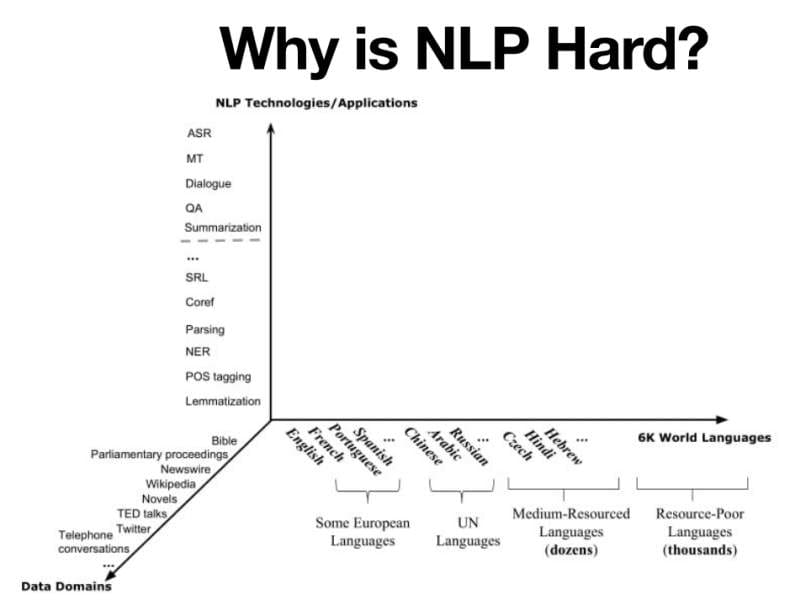3 More Free Top Notch Natural Language Processing Courses
(This article originally appeared on KDNuggets.com here. For more, visit https://www.kdnuggets.com/)
Are you looking to continue your learning of natural language processing? This small collection of 3 free top notch courses will allow you to do just that.
Natural language processing (NLP) is an in-demand set of skills among employers and one of the most sought-after and pursued topics among learners.
Previously, we presented 10 Free Top Notch Natural Language Processing Courses, a collection of 10 free top notch courses will allow you to do just that, with something for every approach to learning NLP and its varied topics. But with spring now upon us, what better time to have a fresh look at a topic like NLP, and do so with some new learning resources.

From CMU's Algorithms for NLP Lecture 1: Introduction slides
Here is a small collection of 3 curated NLP courses ready to help you get your spring learning on, and help increase your understanding and expertise of the vast field of natural language processing.
1. Algorithms for NLP, Carnegie Mellon University
This CMU course is taught by Emma Strubell, Yulia Tsvetkov, and Robert Frederking.
Available resources include slides, readings, projects, assignments.
This course will explore foundational statistical techniques for the automatic analysis of natural (human) language text. Towards this end the course will introduce pragmatic formalisms for representing structure in natural language, and algorithms for annotating raw text with those structures. The dominant modeling paradigm is corpus-driven statistical learning, covering both supervised and unsupervised methods. Algorithms for NLP is a lab-based course. This means that instead of homeworks and exams, you will mainly be graded based on four hands-on coding projects.
Slides, materials, and projects for this iteration of Algorithms for NLP are borrowed from Jacob Eisenstein’s course at Georgia Tech, Dan Jurafsky at Stanford, Dan Klein and David Bamman at UC Berkeley, and Nathan Schneider at Georgetown University.
2. Neural Networks for NLP, Carnegie Mellon University
This CMU course is tuaght by Graham Neubig, with co-instructor Pengfei Liu.
Available resources includes videos, slides, readings, projects, assignments, code.
You can find a direct link to the course lecture videos here.
Neural networks provide powerful new tools for modeling language, and have been used both to improve the state-of-the-art in a number of tasks and to tackle new problems that were not easy in the past. This class will start with a brief overview of neural networks, then spend the majority of the class demonstrating how to apply neural networks to natural language problems. Each section will introduce a particular problem or phenomenon in natural language, describe why it is difficult to model, and demonstrate several models that were designed to tackle this problem. In the process of doing so, the class will cover different techniques that are useful in creating neural network models, including handling variably sized and structured sentences, efficient handling of large data, semi-supervised and unsupervised learning, structured prediction, and multilingual modeling.
3. Natural Language Processing Specialization, DeepLearning.AI
This Coursera-hosted DeepLearning.AI specialization (4 courses) is taught by Younes Bensouda Mourri, Łukasz Kaiser, and Eddy Shyu.
Available resources includes videos, slides, readings, projects, assignments, code (see note below).
Note that you can pay for a certificate, which also gets you access to tutors and assignment grading, but other materials are freely-accessible for those auditing.
Natural Language Processing (NLP) uses algorithms to understand and manipulate human language. This technology is one of the most broadly applied areas of machine learning. As AI continues to expand, so will the demand for professionals skilled at building models that analyze speech and language, uncover contextual patterns, and produce insights from text and audio.
By the end of this Specialization, you will be ready to design NLP applications that perform question-answering and sentiment analysis, create tools to translate languages and summarize text, and even build chatbots. These and other NLP applications are going to be at the forefront of the coming transformation to an AI-powered future.
This Specialization is designed and taught by two experts in NLP, machine learning, and deep learning. Younes Bensouda Mourri is an Instructor of AI at Stanford University who also helped build the Deep Learning Specialization. Łukasz Kaiser is a Staff Research Scientist at Google Brain and the co-author of Tensorflow, the Tensor2Tensor and Trax libraries, and the Transformer paper.
These are 3 free NLP courses you can take in your spare time to ramp up your skills. Looking for more? Be sure to check out 10 Free Top Notch Natural Language Processing Courses!
Stay in the loop.
Subscribe to our newsletter for a weekly update on the latest podcast, news, events, and jobs postings.




